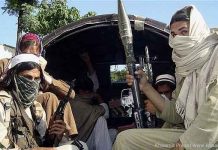New Delhi (NVI): Did China, the epicenter of coronavirus, initially suppress information on the outbreak, as a result of which the world has to suffer the unprecedented catastrophe?
This question is gaining traction as the deadly virus is claiming thousands of lives across countries and continents, with no signs of halting in sight.
The virus, named by the WHO as COVID-19, is causing destruction throughout the globe, with even some top leaders getting infected.
The entire world has been brought to a standstill and the situation is being described as worse than the two World Wars.
The lockdowns and shutdowns are going to shatter economies across the world. There are fears that even the US would go into recession because of the collapse of businesses.
This is besides the huge human toll that the coronavirus is taking in all nations and causing acute panic, where a human being is afraid of touching another human being for the fear of contracting the virus.
Could all this have been averted?
Perhaps yes, if China had admitted about the problem when the outbreak was just happening in Wuhan. But it refused to acknowledge the outbreak even when it was told by the World Health Organisation (WHO) that a mysterious virus was afflicting humans in Wuhan in China.
It was on January 13 that the WHO reported that a person in Thailand, who had visited Wuhan in China, was afflicted with novel coronavirus (2019-nCoV), a strain that had not been previously identified in humans. (NVI reported it that very day).
“WHO reiterates that it is essential that investigations of the novel coronavirus continue in China to identify the source of the outbreak and any animal reservoirs or intermediate hosts,” the global health body tweeted on that day.
At the same time, the WHO warned that the possibility of the novel coronavirus cases being identified in other countries was not unexpected and called for “active monitoring and preparedness” in other countries.
It also issued guidance on how to detect and treat persons ill with the new coronavirus.
The next day, the WHO said that preliminary investigations conducted by the Chinese authorities have found “no clear evidence of human-to-human transmission” of the novel coronavirus (2019-nCoV) identified in Wuhan.
Apparently, China was misleading the WHO or not taking the problem seriously enough, even when three cases were detected outside China — two in Thailand and one in Japan – and all were linked to Wuhan.
Six days later, on January 20, the WHO said China confirmed 139 new cases of coronavirus in Wuhan, Beijing and Shenzen.
“China has reported to WHO 139 new cases of the novel coronavirus (2019-nCoV) in Wuhan, Beijing and Shenzhen over the past two days. This is the result of increased searching and testing for 2019-nCoV among people sick with respiratory illness,” the WHO tweeted.
All the patients were believed to have visited Wuhan.
This was the first time that novel coronavirus (2019-nCoV) cases were reported outside Wuhan, where the virus was first identified, and indicated that it was spreading.
By then it was too late and the problem just exploded, becoming a pandemic which has now engulfed the entire globe.
On January 22, China confirmed that the deadly virus can be passed between humans, as it reported that many people had died and more than 440 had fallen ill due to the virus.
One patient was believed to have infected as many as 14 medical staff in one hospital, suggesting the disease could be spread far more easily than previously thought.
Coronavirus cases were also detected in Taiwan, South Korea, Thailand, Japan, and the US, with reports of potential cases in Australia.
While China was not apparently taking the issue seriously enough, India said on January 17 that its Health Ministry had reviewed the preparedness for dealing with coronavirus and Health Minister Harsh Vardhan was monitoring the situation.
Health and Family Welfare Secretary Preeti Sudan had started regular review of the public health preparedness in India.
As directed by the Health Ministry, meetings of the Joint Monitoring Group (JMG) were convened under the Chairmanship of Director General of Health Services (DGHS) on January 8 and 15 with representations from various stakeholders (health and non-health sectors) and WHO, an official spokesperson said on January 17.
Sudan said the public health preparedness was being reviewed on a day-to-day basis and the core capacities to timely detect and manage the importation of the nCoV into the country were being strengthened further.
While others are blaming China in muted tones for the crisis, US President Donald Trump has been in the forefront of attacking the Communist country. He has described it, at least more than once, as “Chinese virus”, notwithstanding China’s objections.
Trump’s ally and US Senator Tom Cotton has gone a step further and said China should be “held accountable” for the global crisis.
He has introduced a bill, calling for an end to US reliance on Chinese drug manufacturing and encouraging drug production in the United States.
“China unleashed this plague on the world, and China has to be held accountable. That’s why I’m introducing legislation that will say we’re no longer going to buy our basic pharmaceuticals from China. There will be a total ban on buying,” Cotton told Fox News.
The confrontation and blame game is only going to escalate as the mayhem caused by coronavirus continues.
But the question remains — could China have averted this global catastrophe by acting in time?
And also, should WHO have pushed China more on this issue, rather than being soft?








